List of even-toed ungulates by population
| The population of mammals |
|---|
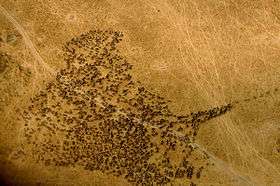 |
This is a list of even-toed ungulate species by estimated global population. This list is not comprehensive, as not all ungulates have had their numbers quantified.
| Common name | Binomial name | Population | Status | Trend | Notes | Image |
|---|---|---|---|---|---|---|
| Saola | Pseudoryx nghetinhensis | < 750[1] | CR[1] | No individuals in captivity. Wild population highly dispersed, and subpopulations fragmented with numbers of mature individuals below the minimum viable population. Foremost threatened by hunting.[1] | ||
| Pygmy hog | Porcula salvania | 250[2] | CR[2] | Maximum estimate for mature individuals.[2] | 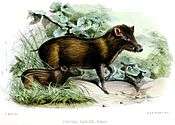 | |
| Bawean deer | Axis kuhlii | 250 – 300[3] | CR[3] | Estimates are for the wild population only; may reach as high as 500.[3] |  | |
| Addax | Addax nasomaculatus | < 100[4] | CR[4] | Maximum estimate for the wild.[4] | 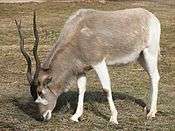 | |
| Tamaraw | Bubalus mindorensis | 300[5] | CR[5] | 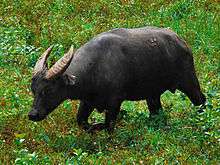 | ||
| Togian babirusa | Babyrousa togeanensis | 500[6] | EN[6] | Maximum estimate.[6] | ||
| Walia ibex | Capra walie | 500[7] | EN[7] |  | ||
| Dama gazelle | Nanger dama | 500[8] | CR[8] | Maximum estimate.[8] | 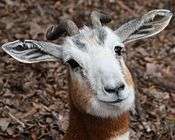 | |
| Hirola | Beatragus hunteri | 500 – 2000[9] | CR[9] | May be much lower.[9] | ||
| Anhui musk deer | Moschus anhuiensis | 700 – 800[10] | EN[10] | Most recent estimate was in 1998.[10] | ||
| Przewalski's gazelle | Procapra przewalskii | 700 – 800[11] | EN[11] | Could be underestimated.[11] | _Gazella_przewalskii.png) | |
| Persian fallow deer | Dama mesopotamica | 715[12] | EN[12] | Previously thought to be extinct.[12] | 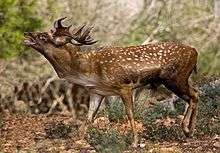 | |
| Wild Bactrian camel | Camelus ferus | 950[13] | CR[13] | Wild population only.[13] | 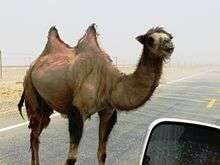 | |
| South Andean deer | Hippocamelus bisulcus | 1048 – 1500[14] | EN[14] | |||
| Calamian deer | Axis calamianensis | 1123[15] | EN[15] | 1994 estimate; has almost certainly decreased.[15] | 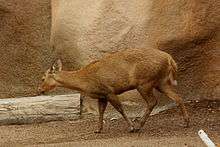 | |
| Abbott's duiker | Cephalophus spadix | 1500[16] | EN[16] | Maximum estimate.[16] | ||
| Cuvier's gazelle | Gazella cuvieri | 1750 – 2950[17] | EN[17] | unknown[17] |  | |
| Nilgiri tahr | Nilgiritragus hylocrius | 1800 – 2000[18] | EN[18] | 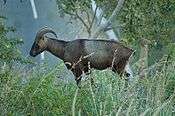 | ||
| Pygmy hippopotamus | Choeropsis liberiensis | 2000 – 3000[19] | EN[19] | Estimate is from 1993; numbers have probably shrunk.[19] | 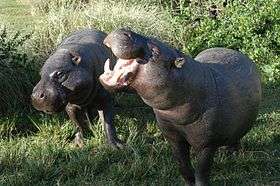 | |
| Mountain anoa | Bubalus quarlesi | 2500[20] | EN[20] | Maximum estimate.[20] | 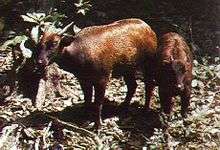 | |
| Rhim gazelle | Gazella leptoceros | 2500[21] | EN[21] | Estimate is for mature individuals only.[21] | .jpg) | |
| Visayan spotted deer | Rusa alfredi | 2500[22] | EN[22] | Maximum estimate.[22] | 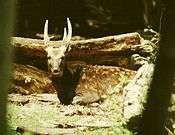 | |
| Mountain Nyala | Tragelaphus buxtoni | 2500 – 4000[23] | EN[23] | 2500 is a maximum estimate from 1999, but recent work has shown numbers may be as high as 4000.[23] | 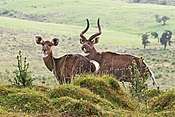 | |
| European bison | Bison bonasus | 3200[24] | VU[24] | Includes 1400 semi-domestic animals and 1800 wild. Semi-domestic numbers are likely underestimated.[24] | 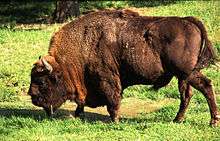 | |
| Chacoan peccary | Catagonus wagneri | 3200[25] | EN[25] | Estimate was made in 2002; wide-scale deforestation of their habitat began in 2003.[25] |  | |
| Wild water buffalo | Bubalus arnee | 3400[26] | EN |  | ||
| Jentink's duiker | Cephalophus jentinki | 3500[27] | EN[27] | Maximum estimate; may be less than 2000.[27] | _Cephalophus_jentinki.png) | |
| Barasingha | Rucervus duvaucelii | 3500 – 5100[28] | VU[28] | 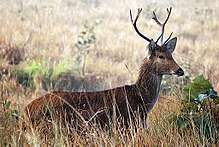 | ||
| Nile lechwe | Kobus megaceros | 4291[29] | EN[29] |  | ||
| Small red brocket | Mazama bororo | 4500[30] | VU[30] | Maximum estimate.[30] | ||
| Arabian tahr | Arabitragus jayakari | 5000[31] | EN[31] | Maximum estimate.[31] | 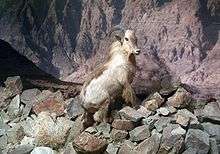 | |
| West Caucasian tur | Capra caucasica | 5000 – 6000[32] | EN[32] | 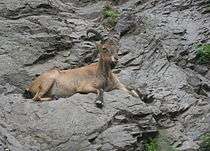 | ||
| Barbary sheep | Ammotragus lervia | 5000 – 10 000[33] | LC[33] | |||
| Beira | Dorcatragus megalotis | 7000[34] | VU[34] | |||
| Arabian Oryx | Oryx leucoryx | 7000 – 8000[35] | VU[35] | 6000 – 7000 in captivity and ~1000 in the wild.[35] | 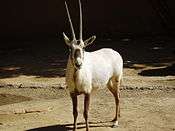 | |
| Hairy-fronted muntjac | Muntiacus crinifrons | 7000 – 8500[36] | VU[36] | Most recent estimate was in 1998.[36] | 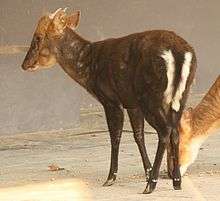 | |
| Banteng | Bos javanicus | 8000[37] | EN[37] | Maximum estimate; may be fewer than 5000. Numbers do not include the non-purebred domestic variety.[37] | 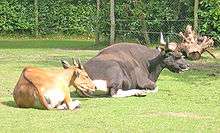 | |
| Markhor | Capra falconeri | 9700[38] | NT[38] | Estimate includes approximately 900 animals assumed to live in areas for which data is unavailable.[38] |  | |
| Nubian ibex | Capra nubiana | 10 000[39] | VU[39] | Maximum estimate.[39] | ||
| Southern pudú | Pudu puda | 10 000[40] | NT[40] | Maximum estimate.[40] | 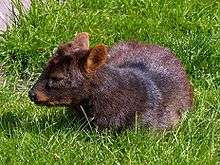 | |
| Red goral | Naemorhedus baileyi | 10 000[41] | VU[41] | Maximum estimate for mature individuals.[41] | ||
| Four-horned antelope | Tetracerus quadricornis | 10 000[42] | LC[42] |  | ||
| Javan rusa | Rusa timorensis | 10 000[43] | VU[43] | Maximum estimate for mature individuals.[22] | .jpg) | |
| Taruca | Hippocamelus antisensis | 12 000 – 17 000[44] | VU[44] | 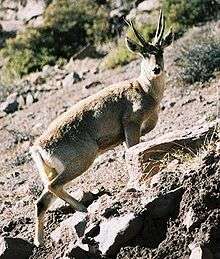 | ||
| Gaur | Bos gaurus | 13 000 – 30 000[45] | VU[45] | 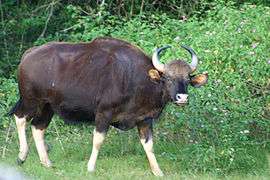 | ||
| Soemmerring's gazelle | Nanger soemmerringii | 14 000[46] | VU[46] | 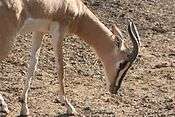 | ||
| Mountain gazelle | Gazella gazella | 15 000[47] | VU[47] | Maximum estimate.[47] | ||
| Wild yak | Bos mutus | 15 000[48] | VU[48] | Estimate is from 1995.[48] | 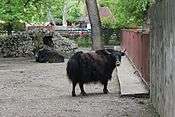 | |
| Giant eland | Tragelaphus derbianus | 15 000 – 20 000[49] | LC[49] | 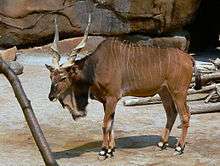 | ||
| Black wildebeest | Connochaetes gnou | 18 000[50] | LC[50] | Minimum estimate (11 000 wild and 7000 semi-domesticated).[50] | 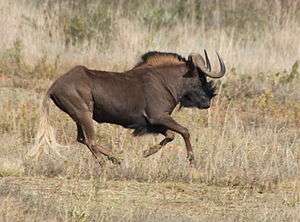 | |
| Grey rhebok | Pelea capreolus | 18 000[51] | LC[51] | 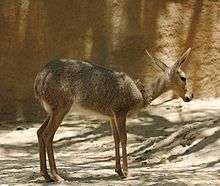 | ||
| Harvey's duiker | Cephalophus harveyi | 20 000[52] | LC[52] | Numbers may be overestimated.[52] | _Cephalophus_harveyi.png) | |
| Pampas deer | Ozotoceros bezoarticus | 20 000 – 80 000[53] | NT[53] | 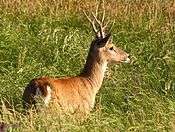 | ||
| Red-fronted gazelle | Eudorcas rufifrons | 25 000[54] | VU[54] | 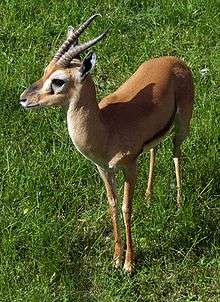 | ||
| Zebra duiker | Cephalophus zebra | 28 000[55] | VU[55] | Could be overestimated; may be less than 15 000.[55] | 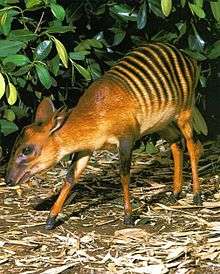 | |
| Bongo | Tragelaphus eurycerus | 28 000[56] | NT[56] | Two subspecies: Mountain (75 – 140) and Lowland (28 000).[56] |  | |
| Alpine ibex | Capra ibex | 30 000[57] | LC[57] | Was as low as 100 individuals in the 1800s.[57] | 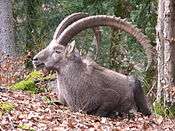 | |
| Silver Dik-dik | Madoqua piacentinii | 30 000[58] | DD[58] | Possibly overestimated.[58] | ||
| Nyala | Tragelaphus angasii | 32 000[59] | LC[59] | 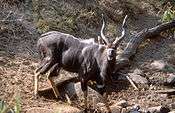 | ||
| Ogilby's duiker | Cephalophus ogilbyi | 35 000[60] | LC[60] | _Cephalophus_ogilbyi.png) | ||
| Okapi | Okapia johnstoni | 35 000 – 50 000[61] | EN[61] | 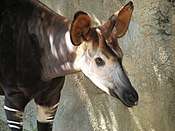 | ||
| Mountain reedbuck | Redunca fulvorufula | 36 000[62] | LC[62] | Minimum estimate, divided into three subspecies: Southern (33 000), Chanler's (2900), and Western (450).[62] |  | |
| Red forest duiker | Cephalophus natalensis | 42 000[63] | LC[63] | Numbers may be underestimated.[63] | ||
| Klipspringer | Oreotragus oreotragus | 42 000[64] | LC[64] | Estimate is considered conservative.[64] |  | |
| Blackbuck | Antilope cervicapra | 50 000[65] | NT[65] | Numbers have increased from 20 – 24 000 in the 1970s.[65] | 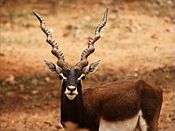 | |
| Spanish ibex | Capra pyrenaica | 50 000[66] | LC[66] | Numbered only ~7900 in the early 1990s.[66] |  | |
| Saiga Antelope | Saiga tatarica | 50 000[67] | CR[67] | Numbers stood at 1 250 000 in the mid-1970s.[67] | 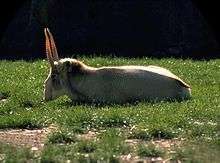 | |
| Royal antelope | Neotragus pygmaeus | 62 000[68] | LC[68] | Possibly underestimated.[68] | 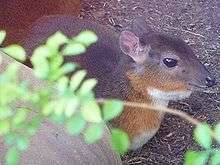 | |
| East African oryx | Oryx beisa | 67 000[69] | NT[69] | Divided into two subspecies: Beisa (50 000) and Fringe-eared (17 000).[69] | 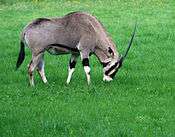 | |
| Southern reedbuck | Redunca arundinum | 73 000[70] | LC[70] | %2C_Kruger_National_Park.jpg) | ||
| Sable antelope | Hippotragus niger | 75 000[71] | LC[71] | 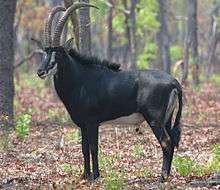 | ||
| Roan antelope | Hippotragus equinus | 76 000[72] | LC[72] | 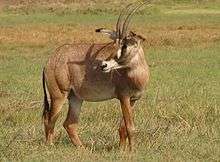 | ||
| Mountain goat | Oreamnos americanus | 80 000 – 119 000[73] | LC[73] | 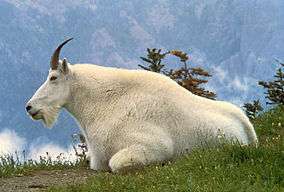 | ||
| Gerenuk | Litocranius walleri | 95 000[74] | NT[74] | 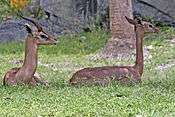 | ||
| Sharpe's Grysbok | Raphicerus sharpei | 95 000[75] | LC[75] | Difficult to study due to the animal's nocturnal nature; numbers may be underestimated.[75] | 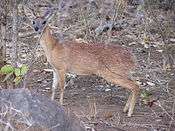 | |
| Japanese serow | Capricornis crispus | 100 000[76] | LC[76] | 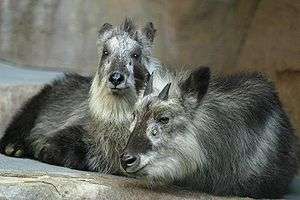 | ||
| Black duiker | Cephalophus niger | 100 000[77] | LC[77] |  | ||
| Bohor reedbuck | Redunca redunca | 101 000[78] | LC[78] | Probably underestimated.[78] | 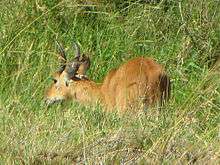 | |
| Dall sheep | Ovis dalli | 111 500 – 116 500[79] | LC[79] | Consists of approximately 41,500 sheep in Canada and between 70,000 and 75,000 animals in the United States.[79] | 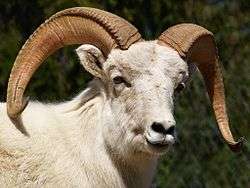 | |
| Hippopotamus | Hippopotamus amphibius | 115 000 – 130 000[80] | VU[80] | Population was estimated to be between 125,000 and 148,000 in a 2008 assessment.[80] |  | |
| Lesser kudu | Tragelaphus imberbis | 118 000[81] | NT[81] | Minimum estimate.[81] | 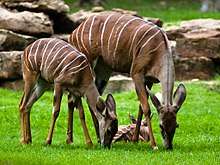 | |
| Goitered gazelle | Gazella subgutturosa | 120 000 – 140 000[82] | VU[82] | |||
| Puku | Kobus vardonii | 130 000[83] | NT[83] | .jpg) | ||
| Muskox | Ovibos moschatus | 133 914 – 136 914[84] | LC[84] | Estimate includes 75,400 animals in the Northwest Territories, 45,300 in Nunavut, 3,714 in Alaska, and between 9,500 and 12,500 in Greenland.[84] | 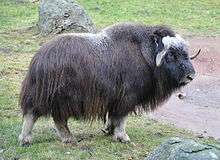 | |
| Common eland | Tragelaphus oryx | 136 000[85] | LC[85] | 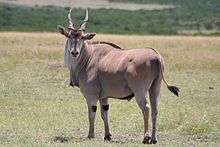 | ||
| Yellow-backed duiker | Cephalophus silvicultor | 160 000[86] | LC[86] | 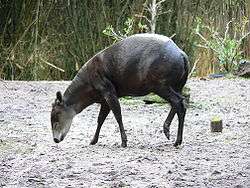 | ||
| Red-flanked duiker | Cephalophus rufilatus | 170 000[87] | LC[87] |  | ||
| Sitatunga | Tragelaphus spekii | 170 000[88] | LC[88] | Yet-to-be-published research suggests the population has been overestimated.[88] | 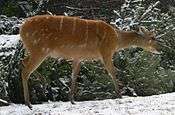 | |
| Weyns's duiker | Cephalophus weynsi | 188 000[89] | LC[89] | |||
| Waterbuck | Kobus ellipsiprymnus | 200 000[90] | LC[90] | About 95 000 of the Defassa subspecies and 105 000 of the Common.[90] |  | |
| Lechwe | Kobus leche | 212 000[91] | LC[91] | Combined numbers of three subspecies: Red (98 000), Kafue (78 000), and Black (36 000).[91] | 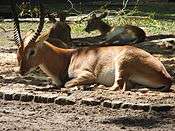 | |
| Bates's pygmy antelope | Neotragus batesi | 219 000[92] | LC[92] | 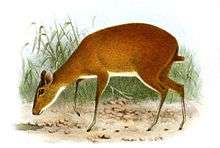 | ||
| Water chevrotain | Hyemoschus aquaticus | 278 000[93] | LC[93] |  | ||
| White-bellied duiker | Cephalophus leucogaster | 287 000[94] | LC[94] | |||
| Black-fronted duiker | Cephalophus nigrifrons | 300 000[95] | LC[95] | 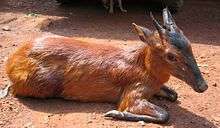 | ||
| Vicuña | Vicugna vicugna | 347 273[96] | LC[96] | |||
| Grant's gazelle | Nanger granti | 350 000[97] | LC[97] | 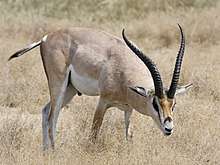 | ||
| Hartebeest | Alcelaphus buselaphus | 362 000[98] | LC[98] | 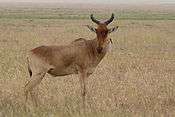 | ||
| Suni | Nesotragus moschatus | 365 000[99] | LC[99] | 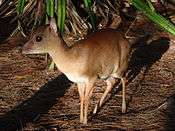 | ||
| Gemsbok | Oryx gazella | 373 000[100] | LC[100] | 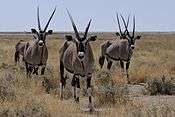 | ||
| Peters's duiker | Cephalophus callipygus | 382 000[101] | LC[101] | _from_behind%2C_Campo_Maan_National_Park.jpg) | ||
| Mongolian gazelle | Procapra gutturosa | 400 000[102] | LC[102] | Unknown[102] | Estimate has dropped from 2 700 000 since 1998.[102] | 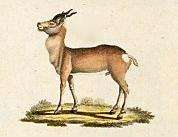 |
| Greater kudu | Tragelaphus strepsiceros | 482 000[103] | LC[103] | 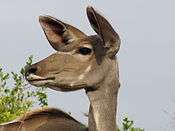 | ||
| Salt's dik-dik | Madoqua saltiana | 485 600[104] | LC[104] | 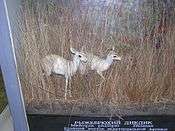 | ||
| Günther's dik-dik | Madoqua guentheri | 511 000[105] | LC[105] | 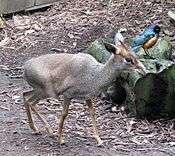 | ||
| American bison | Bison bison | 530 000[106] | NT[106] | Includes 500 000 semi-domestic animals and 30 000 wild (19 000 plains bison and 11 000 wood bison).[106] | 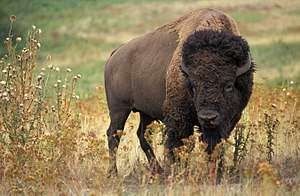 | |
| Guanaco | Lama guanicoe | 535 750 – 589 750[107] | LC[107] | 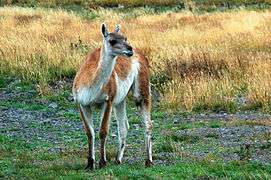 | ||
| Thomson's gazelle | Eudorcas thomsonii | 550 000[108] | NT[108] | 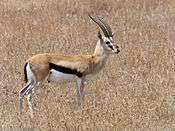 | ||
| Steenbok | Raphicerus campestris | 600 000[109] | LC[40] | Considered an underestimate.[109] |  | |
| Pronghorn | Antilocapra americana | 700 000[110] | LC[110] | Numbered over 35 million in the early 1800s and as little as 20 000 in the early 1920s.[110] |  | |
| Bay duiker | Cephalophus dorsalis | 725 000[111] | LC[111] | |||
| Oribi | Ourebia ourebi | 750 000[112] | LC[112] | 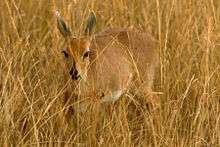 | ||
| African buffalo | Syncerus caffer | 890 000[113] | LC[113] | Considered conservative. Divided into four subspecies: West African Savanna (27 000), Central African Savanna (133 000), Southern Savanna (670 000), & Forest (60 000).[113] | 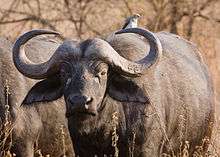 | |
| Kirk's dik-dik | Madoqua kirkii | 971 000[114] | LC[114] | 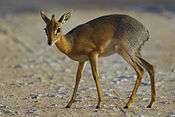 | ||
| Siberian roe deer | Capreolus pygargus | 1 000 000[115] | NT[115] | About 500 000 were hunted annually in Russia in the 1800s.[115] | 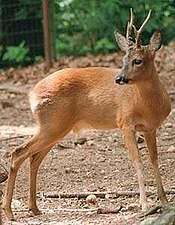 | |
| Bushbuck | Tragelaphus scriptus | 1 340 000[116] | LC[116] | Estimate is considered conservative.[116] | 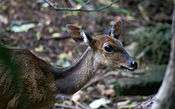 | |
| Moose | Alces alces | 1 500 000[117] | LC[117] | .jpg) | ||
| Blue wildebeest | Connochaetes taurinus | 1 550 000[118] | LC[118] | 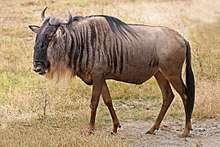 | ||
| Common duiker | Sylvicapra grimmia | 1 660 000[119] | LC[119] | Considered extremely conservative; yet-to-be-published research shows it may number as high as 10 000 000.[119] |  | |
| Impala | Aepyceros melampus | 2 000 000[120] | LC[120] | 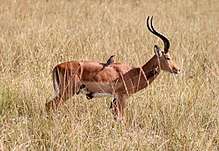 | ||
| Springbok | Antidorcas marsupialis | 2 000 000 – 2 500 000[121] | LC[121] |  | ||
| Maxwell's duiker | Philantomba maxwellii | 2 137 000[122] | LC[122] | Quite possibly underestimated.[122] | 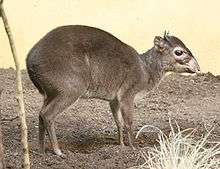 | |
| Blue duiker | Philantomba monticola | 7 000 000[123] | LC[123] | Estimate is considered conservative.[123] | 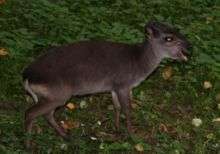 | |
| White-tailed deer | Odocoileus virginianus | 11 500 000[124] | LC[124] | Estimated population in the United States and Canada only, with estimate of 11,000,000 in the US considered a minimum.[124] | 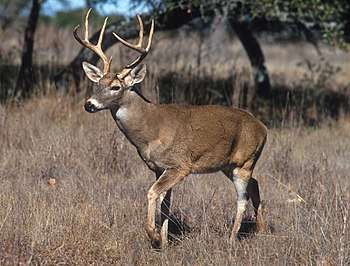 | |
| Domestic goat | Capra aegagrus hircus | 850 000 000[125] | Domesticated | 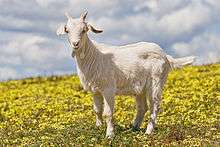 | ||
| Cattle | Bos primigenius taurus | 1 000 000 000[126] | Domesticated |  | ||
| Domestic pig | Sus scrofa domesticus | 1 000 000 000[127] | Domesticated | 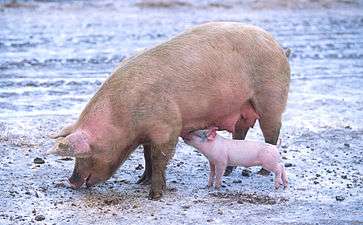 | ||
| Domestic sheep | Ovis aries | 1 000 000 000[127] | Domesticated | .jpg) | ||
| Water buffalo | Bubalus bubalis | 172 000 000 incl. 3.2 Million Carabao in the Philippines[128] | Domesticated | |||
See also
References
- 1 2 3 4 Timmins, R. J., Hedges, S. & Robichaud, W. G. (2016). "Pseudoryx nghetinhensis". The IUCN Red List of Threatened Species. IUCN. 2016: e.T18597A46364962. doi:10.2305/IUCN.UK.2016-2.RLTS.T18597A46364962.en. Retrieved 15 January 2018.
- 1 2 3 4 Narayan, G., Deka, P. & Oliver, W. (2008). "Porcula salvania". The IUCN Red List of Threatened Species. IUCN. 2008: e.T21172A9254675. doi:10.2305/IUCN.UK.2008.RLTS.T21172A9254675.en. Retrieved 15 January 2018.
- 1 2 3 4 Semiadi, G., Pudyatmoko, S., Duckworth, J. W. & Timmins, R. J. (2008). "Axis kuhlii". IUCN Red List of Threatened Species. Version 2014.2. International Union for Conservation of Nature.
- 1 2 3 4 IUCN SSC Antelope Specialist Group (2016). "Addax nasomaculatus". IUCN Red List of Threatened Species. Version 2017-3. International Union for Conservation of Nature.
- 1 2 3 Hedges, S. & Duckworth, J.W. (IUCN SSC Asian Wild Cattle Specialist Group); de Leon, J., Custodio, C. & Gonzales, J.C. (2008). "Bubalus mindorensis". IUCN Red List of Threatened Species. Version 2012.2. IUCN. Retrieved 2012-11-11.
- 1 2 3 4 Macdonald, A.A., Burton, J. & Leus, K. (2008). "Babyrousa togeanensis". IUCN Red List of Threatened Species. Version 2012.2. IUCN. Retrieved 2012-11-11.
- 1 2 3 Geberemedhin, B. & Grubb, P. (2008). "Capra walie". IUCN Red List of Threatened Species. Version 2012.2. IUCN. Retrieved 2012-11-11.
- 1 2 3 4 Newby, J., Wacher, T., Lamarque, F., Cuzin, F. & de Smet, K. (2008). "Nanger dama". IUCN Red List of Threatened Species. Version 2012.2. IUCN. Retrieved 2012-11-11.
- 1 2 3 4 IUCN SSC Antelope Specialist Group (2008). "Beatragus hunteri". IUCN Red List of Threatened Species. Version 2012.2. IUCN. Retrieved 2012-11-11.
- 1 2 3 4 Wang, Y. & Harris, R.B. (2008). "Moschus anhuiensis". IUCN Red List of Threatened Species. Version 2012.2. IUCN. Retrieved 2012-11-11.
- 1 2 3 4 IUCN SSC Antelope Specialist Group (2008). "Procapra przewalskii". IUCN Red List of Threatened Species. Version 2012.2. IUCN. Retrieved 2012-11-12.
- 1 2 3 4 Rabiei, A. & Saltz, D. (2011). "Dama mesopotamica". IUCN Red List of Threatened Species. Version 2012.2. IUCN. Retrieved 2012-11-11.
- 1 2 3 4 Hare, J. (2008). "Camelus ferus". IUCN Red List of Threatened Species. Version 2012.2. IUCN. Retrieved 2012-11-11.
- 1 2 3 Jiménez, J., Guineo, G., Corti, P, Smith, J.A., Flueck, W., Vila, A., Gizejewski, Z., Gill, R., McShea, B. & Geist, V. (2008). "Hippocamelus bisulcus". IUCN Red List of Threatened Species. Version 2012.2. IUCN. Retrieved 2012-11-11.
- 1 2 3 4 Oliver, W., Widmann, P. & Lastica, E. (2008). "Axis calamianensis". IUCN Red List of Threatened Species. Version 2012.2. IUCN. Retrieved 2012-11-11.
- 1 2 3 4 Moyer, D.C., Jones, T. & Rovero, F. (2008). "Cephalophus spadix". IUCN Red List of Threatened Species. Version 2012.2. IUCN. Retrieved 2012-11-11.
- 1 2 3 Mallon, D.P. & Cuzin, F. (2008). "Gazella cuvieri". IUCN Red List of Threatened Species. Version 2012.2. IUCN. Retrieved 2012-11-11.
- 1 2 3 Alempath, M. & Rice, C. (2008). "Nilgiritragus hylocrius". IUCN Red List of Threatened Species. Version 2012.2. IUCN. Retrieved 2012-11-11.
- 1 2 3 4 Lewison, R. & Oliver, W. (IUCN SSC Hippo Specialist Subgroup) (2008). "Choeropsis liberiensis". IUCN Red List of Threatened Species. Version 2012.2. IUCN. Retrieved 2012-11-11.
- 1 2 3 4 Semiadi, G., Burton, J., Schreiber, A. & Mustari, A.H. (2008). "Bubalus quarlesi". IUCN Red List of Threatened Species. Version 2012.2. IUCN. Retrieved 2012-11-11.
- 1 2 3 4 Mallon, D. P., Cuzin, F., de Smet, K. & Hoffmann, M. (2008). "Gazella leptoceros". IUCN Red List of Threatened Species. Version 2014.2. International Union for Conservation of Nature.
- 1 2 3 4 5 Oliver, W., MacKinnon, J., Heaney, L. & Lastica, E. (2008). "Rusa alfredi". IUCN Red List of Threatened Species. Version 2012.2. IUCN. Retrieved 2012-11-12.
- 1 2 3 4 Sillero-Zubiri, C. (2008). "Tragelaphus buxtoni". IUCN Red List of Threatened Species. Version 2012.2. IUCN. Retrieved 2012-11-12.
- 1 2 3 4 Olech, W. (IUCN SSC Bison Specialist Group) (2008). "Bison bonasus". IUCN Red List of Threatened Species. Version 2012.2. IUCN. Retrieved 2012-11-11.
- 1 2 3 4 Altrichter, M., Taber, A., Noss, A. & Maffei, L. (2008). "Catagonus wagneri". IUCN Red List of Threatened Species. Version 2012.2. IUCN. Retrieved 2012-11-11.
- ↑ Choudhury, A. (2010). The vanishing herds : the wild water buffalo. Gibbon Books, Rhino Foundation, CEPF & COA, Taiwan, Guwahati, India.
- 1 2 3 4 IUCN SSC Antelope Specialist Group (2008). "Cephalophus jentinki". IUCN Red List of Threatened Species. Version 2012.2. IUCN. Retrieved 2012-11-11.
- 1 2 3 Duckworth, J.W., Samba Kumar, N., Chiranjibi Prasad Pokheral, Sagar Baral, H. & Timmins, R.J. (2008). "Rucervus duvaucelii". IUCN Red List of Threatened Species. Version 2012.2. IUCN. Retrieved 2012-11-12.
- 1 2 3 IUCN SSC Antelope Specialist Group (2008). "Kobus megaceros". IUCN Red List of Threatened Species. Version 2012.2. IUCN. Retrieved 2012-11-11.
- 1 2 3 4 Duarte, J.M.B. (2008). "Mazama bororo". IUCN Red List of Threatened Species. Version 2012.2. IUCN. Retrieved 2012-11-11.
- 1 2 3 4 Insall, D. (2008). "Arabitragus jayakari". IUCN Red List of Threatened Species. Version 2012.2. IUCN. Retrieved 2012-11-11.
- 1 2 3 Weinberg, P. (2008). "Capra caucasica". IUCN Red List of Threatened Species. Version 2012.2. IUCN. Retrieved 2012-11-11.
- 1 2 3 Cassinello, J., Cuzin, F., Jdeidi, T., Masseti, M., Nader, I. & de Smet, K. (2008). "Ammotragus lervia". IUCN Red List of Threatened Species. Version 2012.2. IUCN. Retrieved 2012-11-11.
- 1 2 3 Heckel, J.-O., Rayaleh, H.A., Wilhelmi, F. & Hammer, S. (2008). "Dorcatragus megalotis". IUCN Red List of Threatened Species. Version 2012.2. IUCN. Retrieved 2012-11-11.
- 1 2 3 4 IUCN SSC Antelope Specialist Group (2011). "Oryx leucoryx". IUCN Red List of Threatened Species. Version 2012.2. IUCN. Retrieved 2012-11-12.
- 1 2 3 4 Harris, R.B. (2008). "Muntiacus crinifrons". IUCN Red List of Threatened Species. Version 2012.2. IUCN. Retrieved 2012-11-11.
- 1 2 3 4 Timmins, R.J., Duckworth, J.W., Hedges, S., Steinmetz, R. & Pattanavibool, A. (2008). "Bos javanicus". IUCN Red List of Threatened Species. Version 2012.2. IUCN. Retrieved 2012-11-11.
- 1 2 3 4 Michel, S. & Rosen Michel, T. (2015). "Capra falconeri". The IUCN Red List of Threatened Species 2015: e.T3787A97218336. IUCN. Retrieved 2018-04-09.
- 1 2 3 4 Alkon, P.U., Harding, L., Jdeidi, T., Masseti, M., Nader, I., de Smet, K., Cuzin, F. & Saltz, D. (2008). "Capra nubiana". IUCN Red List of Threatened Species. Version 2012.2. IUCN. Retrieved 2012-11-11.
- 1 2 3 4 5 Jimenez, J. & Ramilo, E. (2008). "Pudu puda". IUCN Red List of Threatened Species. Version 2012.2. IUCN. Retrieved 2012-11-12.
- 1 2 3 4 Duckworth, J.W. & MacKinnon, J. (2008). "Naemorhedus baileyi". IUCN Red List of Threatened Species. Version 2012.2. IUCN. Retrieved 2012-11-11.
- 1 2 3 Mallon, D.P. (2008). "Tetracerus quadricornis". IUCN Red List of Threatened Species. Version 2012.2. IUCN. Retrieved 2012-11-12.
- 1 2 3 Hedges, S., Duckworth, J.W., Timmins, R.J., Semiadi, G. & Priyono, A. (2008). "Rusa timorensis". IUCN Red List of Threatened Species. Version 2012.2. IUCN. Retrieved 2012-11-12.
- 1 2 3 Barrio, J. & Ferreyra, N. (2008). "Hippocamelus antisensis". IUCN Red List of Threatened Species. Version 2012.2. IUCN. Retrieved 2012-11-11.
- 1 2 3 Duckworth, J.W., Steinmetz, R., Timmins, R.J., Pattanavibool, A., Than Zaw, Do Tuoc & Hedges, S. (2008). "Bos gaurus". IUCN Red List of Threatened Species. Version 2012.2. IUCN. Retrieved 2012-11-11.
- 1 2 3 Heckel, J.-O., Wilhelmi, F., Kaariye, X.Y., Rayaleh, H.A., Amir, O.G. & Künzel, T. (2008). "Nanger soemmerringii". IUCN Red List of Threatened Species. Version 2012.2. IUCN. Retrieved 2012-11-11.
- 1 2 3 4 Mallon, D.P. & Cuzin, F. (2008). "Gazella gazella". IUCN Red List of Threatened Species. Version 2012.2. IUCN. Archived from the original on 2012-11-12. Retrieved 2012-11-11.
- 1 2 3 4 Harris, R.B. & Leslie, D. (2008). "Bos mutus". IUCN Red List of Threatened Species. Version 2012.2. IUCN. Retrieved 2012-11-11.
- 1 2 3 IUCN SSC Antelope Specialist Group (2008). "Tragelaphus derbianus". IUCN Red List of Threatened Species. Version 2012.2. IUCN. Retrieved 2012-11-12.
- 1 2 3 4 IUCN SSC Antelope Specialist Group (2008). "Connochaetes gnou". IUCN Red List of Threatened Species. Version 2012.2. IUCN. Retrieved 2012-11-11.
- 1 2 3 IUCN SSC Antelope Specialist Group (2008). "Pelea capreolus". IUCN Red List of Threatened Species. Version 2012.2. IUCN. Retrieved 2012-11-12.
- 1 2 3 4 IUCN SSC Antelope Specialist Group (2008). "Cephalophus harveyi". IUCN Red List of Threatened Species. Version 2012.2. IUCN. Retrieved 2012-11-11.
- 1 2 3 Gonzalez, S. & Merino, M.L. (2008). "Ozotoceros bezoarticus". IUCN Red List of Threatened Species. Version 2012.2. IUCN. Retrieved 2012-11-12.
- 1 2 3 IUCN SSC Antelope Specialist Group (2008). "Eudorcas rufifrons". IUCN Red List of Threatened Species. Version 2012.2. IUCN. Retrieved 2012-11-11.
- 1 2 3 4 IUCN SSC Antelope Specialist Group (2008). "Cephalophus zebra". IUCN Red List of Threatened Species. Version 2012.2. IUCN. Retrieved 2012-11-11.
- 1 2 3 4 IUCN SSC Antelope Specialist Group (2008). "Tragelaphus eurycerus". IUCN Red List of Threatened Species. Version 2012.2. IUCN. Retrieved 2012-11-12.
- 1 2 3 4 Aulagnier, S., Kranz, A., Lovari, S., Jdeidi, T., Masseti, M., Nader, I., de Smet, K. & Cuzin, F. (2008). "Capra ibex". IUCN Red List of Threatened Species. Version 2012.2. IUCN. Retrieved 2012-11-11.
- 1 2 3 4 IUCN SSC Antelope Specialist Group (2008). "Madoqua piacentinii". IUCN Red List of Threatened Species. Version 2012.2. IUCN. Retrieved 2012-11-11.
- 1 2 3 IUCN SSC Antelope Specialist Group (2008). "Tragelaphus angasii". IUCN Red List of Threatened Species. Version 2012.2. IUCN. Retrieved 2012-11-12.
- 1 2 3 IUCN SSC Antelope Specialist Group (2008). "Cephalophus ogilbyi". IUCN Red List of Threatened Species. Version 2012.2. IUCN. Retrieved 2012-11-11.
- 1 2 3 IUCN SSC Antelope Specialist Group (2008). "Okapia johnstoni". IUCN Red List of Threatened Species. Version 2012.2. IUCN. Retrieved 2012-11-12.
- 1 2 3 4 IUCN SSC Antelope Specialist Group (2008). "Redunca fulvorufula". IUCN Red List of Threatened Species. Version 2012.2. IUCN. Retrieved 2012-11-12.
- 1 2 3 4 IUCN SSC Antelope Specialist Group (2008). "Cephalophus natalensis". IUCN Red List of Threatened Species. Version 2012.2. IUCN. Retrieved 2012-11-11.
- 1 2 3 4 IUCN SSC Antelope Specialist Group (2008). "Oreotragus oreotragus". IUCN Red List of Threatened Species. Version 2012.2. IUCN. Retrieved 2012-11-12.
- 1 2 3 4 Mallon, D.P. (2008). "Antilope cervicapra". IUCN Red List of Threatened Species. Version 2012.2. IUCN. Retrieved 2012-11-11.
- 1 2 3 4 Herrero, J. & Pérez, J.M. (2008). "Capra nubiana". IUCN Red List of Threatened Species. Version 2012.2. IUCN. Retrieved 2012-11-11.
- 1 2 3 4 Mallon, D.P. (2008). "Saiga tatarica". IUCN Red List of Threatened Species. Version 2012.2. IUCN. Retrieved 2012-11-12.
- 1 2 3 4 IUCN SSC Antelope Specialist Group (2008). "Neotragus pygmaeus". IUCN Red List of Threatened Species. Version 2012.2. IUCN. Retrieved 2012-11-11.
- 1 2 3 4 IUCN SSC Antelope Specialist Group (2008). "Oryx beisa". IUCN Red List of Threatened Species. Version 2012.2. IUCN. Retrieved 2012-11-12.
- 1 2 3 IUCN SSC Antelope Specialist Group (2008). "Redunca arundinum". IUCN Red List of Threatened Species. Version 2012.2. IUCN. Retrieved 2012-11-12.
- 1 2 3 IUCN SSC Antelope Specialist Group (2008). "Hippotragus niger". IUCN Red List of Threatened Species. Version 2012.2. IUCN. Retrieved 2012-11-11.
- 1 2 3 IUCN SSC Antelope Specialist Group (2008). "Hippotragus equinus". IUCN Red List of Threatened Species. Version 2012.2. IUCN. Retrieved 2012-11-11.
- 1 2 3 Festa-Bianchet, M. (2008). "Oreamnos americanus". IUCN Red List of Threatened Species. Version 2012.2. IUCN. Retrieved 2012-11-12.
- 1 2 3 IUCN SSC Antelope Specialist Group (2008). "Litocranius walleri". IUCN Red List of Threatened Species. Version 2012.2. IUCN. Retrieved 2012-11-11.
- 1 2 3 4 IUCN SSC Antelope Specialist Group (2008). "Raphicerus sharpei". IUCN Red List of Threatened Species. Version 2012.2. IUCN. Retrieved 2012-11-12.
- 1 2 3 Tokida, K. (2008). "Capricornis crispus". IUCN Red List of Threatened Species. Version 2012.2. IUCN. Retrieved 2012-11-11.
- 1 2 3 IUCN SSC Antelope Specialist Group (2008). "Cephalophus niger". IUCN Red List of Threatened Species. Version 2012.2. IUCN. Retrieved 2012-11-11.
- 1 2 3 4 IUCN SSC Antelope Specialist Group (2008). "Redunca redunca". IUCN Red List of Threatened Species. Version 2012.2. IUCN. Retrieved 2012-11-12.
- 1 2 3 4 Festa-Bianchet, M. (2008). "Ovis dalli". IUCN Red List of Threatened Species. Version 2012.2. IUCN. Retrieved 2012-11-12.
- 1 2 3 4 Lewison, R. & Pluháček, J. (2017). "Hippopotamus amphibius". The IUCN Red List of Threatened Species 2017: e.T10103A18567364. IUCN. Retrieved 2018-04-08.
- 1 2 3 4 IUCN SSC Antelope Specialist Group (2008). "Tragelaphus imberbis". IUCN Red List of Threatened Species. Version 2012.2. IUCN. Retrieved 2012-11-12.
- 1 2 3 Mallon, D.P. (2008). "Gazella subgutturosa". IUCN Red List of Threatened Species. Version 2012.2. IUCN. Retrieved 2012-11-11.
- 1 2 3 IUCN SSC Antelope Specialist Group (2008). "Kobus vardonii". IUCN Red List of Threatened Species. Version 2012.2. IUCN. Retrieved 2012-11-11.
- 1 2 3 4 Gunn, A. & Forchhammer, M. (2008). "Ovibos moschatus". The IUCN Red List of Threatened Species 2008: e.T29684A86066477. IUCN. Retrieved 2018-04-09.
- 1 2 3 IUCN SSC Antelope Specialist Group (2008). "Tragelaphus oryx". IUCN Red List of Threatened Species. Version 2012.2. IUCN. Retrieved 2012-11-12.
- 1 2 3 IUCN SSC Antelope Specialist Group (2008). "Cephalophus silvicultor". IUCN Red List of Threatened Species. Version 2012.2. IUCN. Retrieved 2012-11-11.
- 1 2 3 IUCN SSC Antelope Specialist Group (2008). "Cephalophus rufilatus". IUCN Red List of Threatened Species. Version 2012.2. IUCN. Retrieved 2012-11-11.
- 1 2 3 4 IUCN SSC Antelope Specialist Group (2008). "Tragelaphus spekii". IUCN Red List of Threatened Species. Version 2012.2. IUCN. Retrieved 2012-11-12.
- 1 2 3 IUCN SSC Antelope Specialist Group (2008). "Cephalophus weynsi". IUCN Red List of Threatened Species. Version 2012.2. IUCN. Retrieved 2012-11-11.
- 1 2 3 4 IUCN SSC Antelope Specialist Group (2008). "Kobus ellipsiprymnus". IUCN Red List of Threatened Species. Version 2012.2. IUCN. Retrieved 2012-11-11.
- 1 2 3 4 IUCN SSC Antelope Specialist Group (2008). "Kobus leche". IUCN Red List of Threatened Species. Version 2012.2. IUCN. Retrieved 2012-11-11.
- 1 2 3 IUCN SSC Antelope Specialist Group (2008). "Neotragus batesi". IUCN Red List of Threatened Species. Version 2012.2. IUCN. Retrieved 2012-11-11.
- 1 2 3 IUCN SSC Antelope Specialist Group (2008). "Hyemoschus aquaticus". IUCN Red List of Threatened Species. Version 2012.2. IUCN. Retrieved 2012-11-11.
- 1 2 3 IUCN SSC Antelope Specialist Group (2008). "Cephalophus leucogaster". IUCN Red List of Threatened Species. Version 2012.2. IUCN. Retrieved 2012-11-11.
- 1 2 3 IUCN SSC Antelope Specialist Group (2008). "Cephalophus nigrifrons". IUCN Red List of Threatened Species. Version 2012.2. IUCN. Retrieved 2012-11-11.
- 1 2 3 IUCN SSC Antelope Specialist Group (2008). "Vicugna vicugna". IUCN Red List of Threatened Species. Version 2012.2. IUCN. Retrieved 2012-11-12.
- 1 2 3 IUCN SSC Antelope Specialist Group (2008). "Nanger granti". IUCN Red List of Threatened Species. Version 2012.2. IUCN. Retrieved 2012-11-11.
- 1 2 3 IUCN SSC Antelope Specialist Group (2008). "Alcelaphus buselaphus". IUCN Red List of Threatened Species. Version 2012.2. IUCN. Retrieved 2012-11-11.
- 1 2 3 IUCN SSC Antelope Specialist Group (2008). "Nesotragus moschatus". IUCN Red List of Threatened Species. Version 2012.2. IUCN. Retrieved 2012-11-11.
- 1 2 3 IUCN SSC Antelope Specialist Group (2008). "Oryx gazella". IUCN Red List of Threatened Species. Version 2012.2. IUCN. Retrieved 2012-11-12.
- 1 2 3 IUCN SSC Antelope Specialist Group (2008). "Cephalophus callipygus". IUCN Red List of Threatened Species. Version 2012.2. IUCN. Retrieved 2012-11-11.
- 1 2 3 4 Mallon, D.P. (2008). "Procapra gutturosa". IUCN Red List of Threatened Species. Version 2012.2. IUCN. Retrieved 2012-11-12.
- 1 2 3 IUCN SSC Antelope Specialist Group (2008). "Tragelaphus strepsiceros". IUCN Red List of Threatened Species. Version 2012.2. IUCN. Retrieved 2012-11-12.
- 1 2 3 Heckel, J.-O., Wilhelmi, F., Kaariye, X.Y., Rayaleh, H.A. & Amir, O.G. (2008). "Madoqua saltiana". IUCN Red List of Threatened Species. Version 2012.2. IUCN. Retrieved 2012-11-11.
- 1 2 3 IUCN SSC Antelope Specialist Group (2008). "Madoqua guentheri". IUCN Red List of Threatened Species. Version 2012.2. IUCN. Retrieved 2012-11-11.
- 1 2 3 4 Gates, C. & Aune, K. (2008). "Bison bison". IUCN Red List of Threatened Species. Version 2012.2. IUCN. Retrieved 2012-11-11.
- 1 2 3 Baldi, B., Lichtenstein G., González, B., Funes, M., Cuéllar, E., Villalba, L., Hoces, D. & Puig, S. (2008). "Lama guanicoe". IUCN Red List of Threatened Species. Version 2012.2. IUCN. Retrieved 2012-11-11.
- 1 2 3 IUCN SSC Antelope Specialist Group (2008). "Eudorcas thomsonii". IUCN Red List of Threatened Species. Version 2012.2. IUCN. Retrieved 2012-11-11.
- 1 2 3 IUCN SSC Antelope Specialist Group (2008). "Raphicerus campestris". IUCN Red List of Threatened Species. Version 2012.2. IUCN. Retrieved 2012-11-12.
- 1 2 3 4 Hoffmann, M., Byers, J. & Beckmann, J. (2008). "Antilocapra americana". IUCN Red List of Threatened Species. Version 2012.2. IUCN. Retrieved 2012-11-11.
- 1 2 3 IUCN SSC Antelope Specialist Group (2008). "Cephalophus dorsalis". IUCN Red List of Threatened Species. Version 2012.2. IUCN. Retrieved 2012-11-11.
- 1 2 3 IUCN SSC Antelope Specialist Group (2008). "Ourebia ourebi". IUCN Red List of Threatened Species. Version 2012.2. IUCN. Retrieved 2012-11-12.
- 1 2 3 4 IUCN SSC Antelope Specialist Group (2008). "Syncerus caffer". IUCN Red List of Threatened Species. Version 2012.2. IUCN. Retrieved 2012-11-12.
- 1 2 3 IUCN SSC Antelope Specialist Group (2008). "Madoqua kirkii". IUCN Red List of Threatened Species. Version 2012.2. IUCN. Retrieved 2012-11-11.
- 1 2 3 4 Gonzalez, T. & Tsytsulina, K. (2008). "Capreolus pygargus". IUCN Red List of Threatened Species. Version 2012.2. IUCN. Retrieved 2012-11-11.
- 1 2 3 4 IUCN SSC Antelope Specialist Group (2008). "Tragelaphus scriptus". IUCN Red List of Threatened Species. Version 2012.2. IUCN. Retrieved 2012-11-12.
- 1 2 3 IUCN SSC Antelope Specialist Group (2008). "Alces alces". IUCN Red List of Threatened Species. Version 2012.2. IUCN. Archived from the original on 2012-11-11. Retrieved 2012-11-11.
- 1 2 3 IUCN SSC Antelope Specialist Group (2008). "Connochaetes taurinus". IUCN Red List of Threatened Species. Version 2012.2. IUCN. Retrieved 2012-11-11.
- 1 2 3 4 IUCN SSC Antelope Specialist Group (2008). "Sylvicapra grimmia". IUCN Red List of Threatened Species. Version 2012.2. IUCN. Retrieved 2012-11-12.
- 1 2 3 IUCN SSC Antelope Specialist Group (2008). "Aepyceros melampus". IUCN Red List of Threatened Species. Version 2012.2. IUCN. Retrieved 2012-11-11.
- 1 2 3 IUCN SSC Antelope Specialist Group (2008). "Antidorcas marsupialis". IUCN Red List of Threatened Species. Version 2012.2. IUCN. Retrieved 2012-11-11.
- 1 2 3 4 IUCN SSC Antelope Specialist Group (2008). "Philantomba maxwellii". IUCN Red List of Threatened Species. Version 2012.2. IUCN. Retrieved 2012-11-12.
- 1 2 3 4 IUCN SSC Antelope Specialist Group (2008). "Philantomba monticola". IUCN Red List of Threatened Species. Version 2012.2. IUCN. Retrieved 2012-11-12.
- 1 2 3 4 Gallina, S. and Lopez Arevalo, H. (2016). "Odocoileus virginianus". The IUCN Red List of Threatened Species 2016: e.T42394A22162580. IUCN. Retrieved 2018-04-09.
- ↑ http://www.lohmann-information.com/content/l_i_45_artikel17.pdf
- ↑ http://www.statista.com/statistics/263979/global-cattle-population-since-1990/
- 1 2 http://www.hobbyfarms.com/farm-industry-news/2011/11/22/2011-livestock-population-trends.aspx
- ↑ Borghese, A. (2011). Situation and Perspectives of Buffalo in the World, Europe and Macedonia. Macedonian Journal of Animal Science 1 (2): 281–296.
This article is issued from
Wikipedia.
The text is licensed under Creative Commons - Attribution - Sharealike.
Additional terms may apply for the media files.
